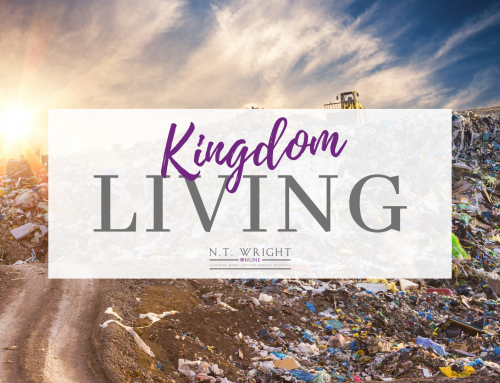One of my roles in leading this effort called N.T. Wright Online is to provide a framework for understanding the apparent ‘goal’ or ‘end’ to which the biblical narrative points. Of course, many of Prof. Wright’s teachings focus on this. In the world of many Christians, the idea of ‘what’s in it for me’ often seems to be the focus of concern. I understand that. Many people have a deep sense that they are in need of God’s intervention, a ‘healing’ perhaps, or a desire to be at peace with God. This is evident even in the Gospel narratives where people are approaching Jesus to solve a particular problem.
Perhaps we think of the paralytic who complains that nobody is available to place him in the Pool of Bethesda when the water is stirred. The expectation was that if he was the first one into the water, a healing would have taken place. We find this story in John Chapter Five:
After this there was a Jewish festival, and Jesus went up to Jerusalem.
In Jerusalem, near the Sheep Gate, there is a pool which is called, in Hebrew, Bethesda. It has five porticoes, 3 where there were several sick people lying. They were blind, lame and paralysed.
There was a man who had been there, in the same sick state, for thirty-eight years. 6 Jesus saw him lying there, and knew that he had been there a long time already.
‘Do you want to get well?’ he asked him.
‘Well, sir,’ the sick man replied, ‘I don’t have anyone to put me into the pool when the water gets stirred up. While I’m on my way there, someone else gets down before me.’
‘Get up,’ said Jesus, ‘pick up your mattress and walk!’
At once the man was healed. He picked up his mattress and walked.
The day all this happened was a sabbath. 10 So the Judaeans confronted the man who had been healed.
‘It’s the sabbath!’ they said. ‘You shouldn’t be carrying your mattress!’
‘Well,’ he replied, ‘the man who cured me told me to pick up my mattress and walk!’
‘Oh, really?’ they said. ‘And who is this man, who told you to pick it up and walk?’
But the man who’d been healed didn’t know who it was. Jesus had gone away, and the place was crowded.
After this Jesus found the man in the Temple.
‘Look!’ he said. ‘You’re better again! Don’t sin any more, or something worse might happen to you!’
The man went off and told the Judaeans that it was Jesus who had healed him. 16 This was why the Judaeans began to persecute Jesus, because he did these things on the sabbath.
This was Jesus’ response to them.
‘My father’, he said, ‘is going on working, and so am I!’
So for this reason the Judaeans were all the more eager to kill him, because he not only broke the sabbath, but spoke of God as his own father, making himself equal to God.
John 5:1-15 (KNT)
Assumptions
Isn’t it amazing to examine the ‘assumptions’ of the many people involved? The paralyzed man thought he knew that the answer to his problem was found in the Pool of Bethesda. Jesus becomes the answer to his problem by healing him, very unexpectedly, it seems. The man did not ask to be healed; the man just described his barrier to healing. Jesus changed the world of this man (as well as the world of Jewish leaders) by restoring his body. The man gets up, takes up his mat, and walks. Jesus upsets the people there because he breaks the rules of ‘the way things are supposed to be’. The Pool of Bethesda becomes irrelevant to the paralytic; the Jewish leaders complain that the healed man is walking around carrying his mat against Sabbath laws; Jesus explains, much to the consternation of the Jewish leaders, that the Father is at work so Jesus must be at work as well. As John writes,
‘So for this reason the Judaeans were all the more eager to kill him, because he not only broke the Sabbath, but spoke of God as his own father, making himself equal to God’.
God seems to ‘break the rules’ by restoring the man to health and, at the same time, be present in Jesus himself. God is not supposed to do that, so thought the Jewish leaders. But, of course, the restoration of things that are broken IS what God is about. It is we who forget the ultimate plan of God and focus on our own personal, local, or religious concerns.
I happen to live in Waukesha, Wisconsin, where we have a street named Bethesda, a school named Bethesda, and a park named Bethesda. In times past, the city was a destination for many people who were seeking the restoration of their bodies through the healing, ‘medicinal’ waters that came from the wells of this geographical area. There used to be a thriving ‘spa’ atmosphere because of the famous qualities of the water and people would come to the businesses that catered to those seeking cures for their ailments.
Think of the mixture of motivations and assumptions surrounding that era: ailments cured or helped by the medicinal waters, money to be made by the local business people who could ‘market’ the spa reputation, pride of the local people who knew that their small city was a destination. Now, those ‘health spas’ of past times are long gone and the city is more known for manufacturing and also as the birthplace of Les Paul, the inventor of the electric guitar! If people wish for healing, they go to the local hospital or to their doctor. Money is still made by those who cater to the need… now it is called the ‘healthcare industry’. But the needs still exist and there are methods of seeking solutions to one’s maladies.
How Jesus Changes Expectations
Jesus has changed the rules and the expectations. Something new has broken into the world with his coming. The Kingdom of God is active and moving in and through God and his people.
During the first part of 2020, we at N.T. Wright Online are putting the focus on this idea of Kingdom Living at the forefront of our efforts. In these times there is a plethora of problems—whether personal, national, or even international—we are trying to remind everyone that for all those needs, Jesus has changed the narrative. We are part of the New Creation people of God. The restoration project that has been going on since Genesis Three has found its ‘goal’ its ‘end’ in Jesus the King. We, the people who are in the Messiah, are those who reflect God’s continuing work in the world. Restoration and Renewal are the ends to which we point.
The title of this piece is ‘The Gospel and the Kingdom of God’ because we often think of ‘Gospel’ as the part that brings the forgiveness of sins (and of course, that is part of the idea), but ‘Gospel’ is the announcement that everything has changed in the coming of Jesus and it leads us to a new kind of living. It is a Kingdom of God lifestyle with allegiance to a King as the ultimate restorer. We are his workers to reflect that good news and a new way of life in a world that is seeking answers in profoundly short-sighted ways rather than in the Way of Jesus.
‘Gospel’ is the announcement that everything has changed in the coming of Jesus and it leads us to a new kind of living. It is a Kingdom of God lifestyle with allegiance to a King as the ultimate restorer. Click To TweetStudy Kingdom Living
So, join us as we highlight this Way of the Kingdom of God, Kingdom of God Living, if you will. We will be putting focus on resources to helps us zero in on personal elements of Kingdom Living. We also realize that there are elements of Kingdom Living that are desperately needed in the society at large. Thus, we will engage with what God provides for us in that sphere as well. We won’t forget that churches, as well, are in need of a re-focusing on ‘The Gospel and the Kingdom of God’.
Watch for these resources as they are provided in the days ahead. Let’s expect what Jesus inaugurated: the reign and rule of the King and his Kingdom.
David P. Seemuth, PhD
Latest posts by David P. Seemuth, PhD (see all)
- Advent Reflections from the N.T. Wright Online Team - December 5, 2022
- YouTube as Public Reading of Scripture - August 29, 2022
- What I Learned From A Week With Professor Wright - June 16, 2022




